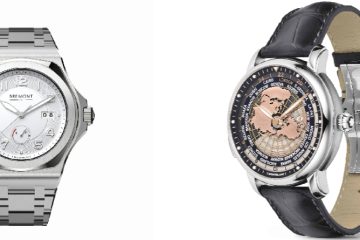The London Fashion and Technology Pioneers

The convergence of the fashion and technology industries is especially noticeable in London, Europe’s largest technology ecosystem. Recent winners of Prince William’s The Earthshot Prize include the London-based startup Notpla. Each awardee receives a £1,000,000 grant to further their efforts in environmental and sustainability-related fields. The company’s founders, Pierre Paslier and Rodrigo Garcia Gonzalez, found a way to create plastic from seaweed and other plants. It’s completely biodegradable and has many potential applications, such as in the cosmetics and clothing industries where a special paper is needed. The UK capital is quickly becoming one of the most attractive places to start or grow a fashion-technology business due to the proliferation of charities like Prince William’s Earthshot prize, as well as new venture capital (VC) and investment firms dedicated to the fashion industry.
London has ambitious goals to become a net zero carbon city by 2030, but climate change is just one area where fashion technology is making strides. The potential in fashion technology not only solves issues in e-commerce but also creates novel brand-consumer interactions. It uses the potential of the metaverse to introduce safer and more convenient digital means of exchange, verification, and manufacturing. Fast-growing businesses in the arts, urban innovation, the life sciences, and the financial services, technology, and business services are among those supported by the Mayor’s Business Growth Program. Nanoloom, an engineering firm, used the programme to advance the development of a biodegradable graphene-based fibre. Co-Founder Victoria Matacyznski remarked that the programme was beneficial for establishing contacts with numerous members of the ecosystem. London is a major centre for financial technology, so it was fantastic. Particularly for a high-tech start-up, your location is likely to be quite consequential. To be precise, we are in London at the BioScience Innovation Center. This is an area set aside for scientific experimentation. This means that every precaution has been taken.
The United Kingdom’s fashion industry relies heavily on the support of investment programmes like Innovate UK and Fashion District. Recently, Nanoloom received a grant from Innovate UK to help them bring their new prototype to market. Grants totaling £3.1bn were distributed by Innovate UK between 2020 and 2021. Connecting investors with designers, makers, and entrepreneurs, with a focus on investing in ideas related to technology, the environment, and businesses with a social conscience, is the primary goal of Fashion District’s collaboration with industry heavyweights like the British Fashion Council, UAL: London College of Fashion, and others in the area.
Innovative Methodologies for Total Immersion
Almost half of all British businesses are located in London, where you’ll find 215 companies working on immersive technology. A prime example is Drest, 2019’s first-ever luxury fashion-styling mobile game. By providing a platform for users to learn about and interact with various fashion brands, this app opens up the world of style to a wider audience. According to CEO Lisa Bridgett, “since our launch in 2019, we have experienced a 250% year-on-year user growth amongst a highly engaged, fashion-loving community of primarily females between the ages of 18 and 29.” London was an obvious choice for Drest’s headquarters when its founder, Lucy Yeomans, decided to establish the company there because it is a progressive and forward-thinking metropolis with connections to countries all over the world, including the United States, Europe, and Asia. London has long been regarded as the epicentre of the global fashion industry, and for good reason: it is where e-commerce was first developed.
When it comes to environmental concerns, Bridgett is convinced that “gaming can be used as a force for good.” “As we continue to discuss the metaverse, it becomes more apparent that we will be spending a great deal of time in virtual worlds in the coming years. She adds, “Studies show that in the future, 70% of Gen Z gamers, 63% of Millennial gamers, and 53% of Gen X gamers all plan to hang out in virtual game worlds without even playing a game. Building a digital wardrobe will become as important, if not more so, than having a physical closet because clothing and the way we present ourselves, both in person and through our avatars online, remain extremely important. Our players enjoy amassing their virtual closets, and since most of their items are transferable between challenges, they need not purchase new virtual garments for each brief.
E-Commerce
A recent report by London & Partners and dealroom.co found that London ecommerce companies will attract $5 billion in venture capital funding by 2021, placing the UK at the fourth spot globally for VC funding into digital shopping. By Rotation, a peer-to-peer fashion rental app, is just one of many tech-based fashion companies that have set up shop in London. According to CEO and co-founder Eshita Kabra-Davies: “We’ve actually been dubbed as the Instagram of fashion rental.” Free download, user account creation, and mutual following are all possible. It’s great because you usually find other people who are about the same size as you.
The pandemic was a major setback for By Rotation and many other companies. Kabra-Davies counters that the quarantine helped “educate people into reconsidering how many things they actually need,” particularly with regards to clothing. She believes that “many people” have “become much more mindful about how much they need” and “taken stock” of their consumerist behaviour. “Instead of buying a dress from one of those fast fashion stores just to wear it for the weekend, you can borrow one from a friend for the same price, or even less, and it will be of much higher quality,” she said. The goal of the user-driven, community-supported platform is to change the way its users consume clothing by providing them with the tools and resources they need to lessen their impact on the environment, such as lowering their landfill waste and increasing their carbon footprint, among other things. “I think London has been supportive in creating a global citizen landscape that a lot of tech founders really need, especially when we’re thinking of scaling up our business,” she says. A lot of people refer to London as “Europe’s Silicon Valley,” which I believe to be an accurate description.
Sustainability

There are a number of companies in London that are dedicated to improving sustainability in various ways, from the creation of new materials (like Notpla’s plastic alternative) to the launch of innovative e-commerce platforms. The primary focus of the Save Your Wardrobe campaign is on preserving the environment. Mehdi Doghri and Hasna Kourda, a married couple, created the programme to help people shop less by getting more use out of their existing wardrobes. Doghri explains that the inspiration for the concept came to Kourda “as she was working in fashion and seeing how wasteful the industry is and how, I think consumer behaviour was also non-sustainable.” “Our goal was to have an effect on the market by altering consumer habits.
There are plenty of startups with the same idea of digitising closets, but what sets Save Your Wardrobe apart is its focus on maximising garment longevity. When asked to elaborate, he says, “You have the item that is digitised, but then you must find the right [repair] service.” Save Your Wardrobe excels at helping users “learn what repairs are needed, how much it costs, and who can actually do it.” Taking care of your clothes is the foundation of a sustainable fashion mentality, according to this firm. That’s the big idea they’re selling to customers. In the meantime, “we really are trying to fix the problem that people have right now in their homes and in their wardrobes for the next few years until, hopefully, some others will fix the industry at the roots,” he says.
In 2017, Petit Pli, a sustainable childrenswear brand founded as a school project, took home the James Dyson Award for Innovation in the United Kingdom for its novel approach to manufacturing children’s garments. While pursuing his degree in Global Innovation Design at Imperial College London and the Royal College of Art, Petit Pli’s CEO and founder, Ryan Mario Yasin, developed the company’s patented technology. To start and expand a sustainable, circular business, London is ideal, according to Yasin. In the United Kingdom, it is the centre of the investment industry and the gathering place for discerning consumers. More and more exchange-traded funds (ETFs) and investment companies with a mandate to invest sustainably are listed on the London Stock Exchange, a sign that London is assisting investors in their pursuit of green opportunities. Investors poured $2.6 billion into renewable energy infrastructure investment firms in the first half of 2021. The implications for sustainable small and medium-sized enterprises (SMEs) in London are clear: they can not only make it, but thrive.
The Role of Venture Capitalists and Investors

Investors and venture capitalists (VCs) are the backbone of any thriving business, and London’s startup ecosystem can compete with Silicon Valley’s. The Mills Fabrica is a hub for fostering techstyle innovation in the fashion industry. Their mission is to create a sustainable future through the use of technology-enabled solutions across the board, from procurement and manufacturing to the development of new materials and finished goods. Nikita Jayasuriya, the company’s head in Europe, says the prosperous real estate market is due in large part to the fashion business. He explains that investing in the manufacturing textile supply chain and the production side of the industry is the only way to make a significant impact in the industry as it stands today. You solve and turn that, and invest in sustainable solutions, which can help basically change the industry if you can fix everything behind what I call the velvet curtain that no one sees.
Originally from Hong Kong, The Mills Fabrica established a London location in 2018. Their dedication to collaborating with like-minded entrepreneurs and UK talent is exemplified by their work with Central St. Martins, among other institutions. You have the Crick Institute here, Central St. Martins, UCL (University College London), the British Library, and Google’s second largest office on the planet is being built directly across from us at this very moment, so it’s going to be an epicentre for knowledge, he says. Through a collaboration with Central St. Martins, they offer a cash prize and a three-month residency to deserving students in either Hong Kong or London at their shared office spaces. Fabrica Lab is a shared space where students can use tools like laser cutters, wash testing, cut and sew machines, and 3D printers. We want them to have faith in themselves, he says. We hope that after graduation they will continue to put faith in themselves, prioritise self-improvement, and push forward with their ideas and innovations.
London’s thriving fashion and tech scenes are a result of efforts by organisations like the British Fashion Council (BFC), which brings together professionals from the country’s fashion industry (including designers, creatives, brand partners, media, and retailers). The Fashion Innovation Agency (FIA) at the London College of Fashion uses cutting-edge technology to disrupt the fashion and retail industries. Executive Director of London & Partners, Laura Citron, applauds the city for its innovative business practises. “Technology continues to disrupt traditional industries,” she says, “from financial services and fashion to retail and health care.” London leads the convergence trend thanks to its strengths in all of these sectors. London is a one-of-a-kind location for expanding and maturing a fashion technology business due to the city’s world-class fashion and technology sectors.
Leave a reply
You must be logged in to post a comment.








